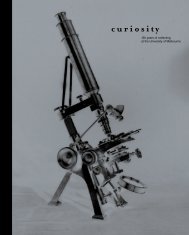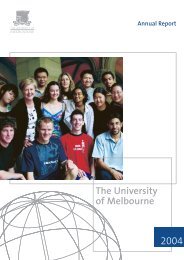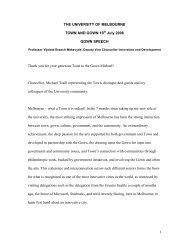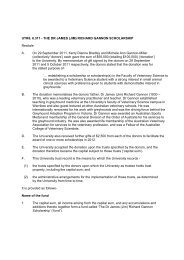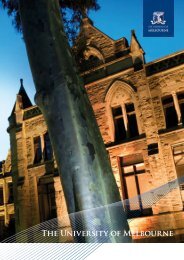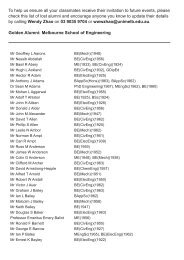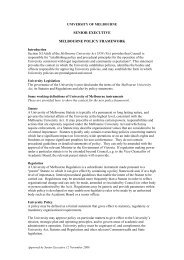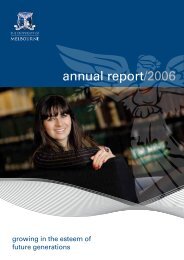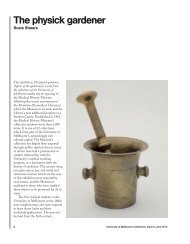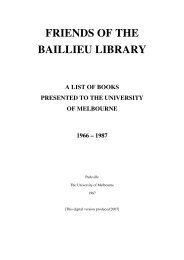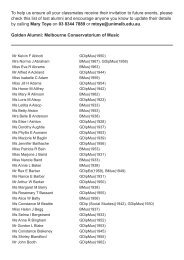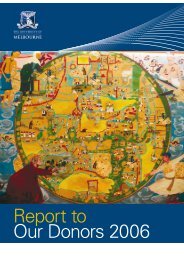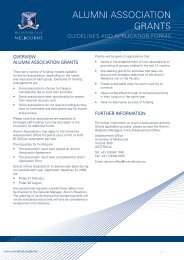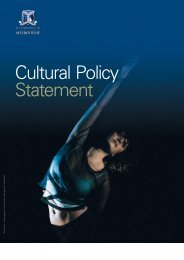2010 International Undergraduate Prospectus nts. u.au
2010 International Undergraduate Prospectus nts. u.au
2010 International Undergraduate Prospectus nts. u.au
Create successful ePaper yourself
Turn your PDF publications into a flip-book with our unique Google optimized e-Paper software.
68<br />
Did you know?<br />
In 2009, the Faculty of Music will join with Victorian College of the Arts School of Music to create a new School of Music at the University<br />
of Melbourne. The new School will be the largest music school in Australia, building on the already outstanding national and international<br />
reputation of music at Melbourne. The new School of Music will deliver programs of the highest quality, offering intensive studies in<br />
performance, improvisation, composition, musicology, ethnomusicology, music education and music therapy. It will offer a variety of<br />
pathways into professional graduate coursework programs as well as strengthening research and research higher degree education and<br />
interaction with the profession, locally, nationally and internationally.<br />
In <strong>2010</strong>, the new School of Music will deliver two undergraduate degrees, the Bachelor of Music (Faculty of Music) and Bachelor of Music<br />
Performance (VCA Music). From 2011, undergraduate studies in music at Melbourne will be combined into a single Melbourne Model<br />
Bachelor of Music degree, offering a rich range of choices, experiences, career outcomes and postgraduate pathways for stude<strong>nts</strong>.<br />
Bachelor of Music<br />
Duration<br />
3 years full-time<br />
Fees<br />
See page 104<br />
Campus<br />
Parkville Campus<br />
Entry requireme<strong>nts</strong><br />
See pages 119–127<br />
Extra requireme<strong>nts</strong><br />
An <strong>au</strong>dition is required<br />
About the Bachelor of Music<br />
The Bachelor of Music is one of<br />
the University of Melbourne’s New<br />
Generation, Melbourne Model degrees. It<br />
is a performance-based degree, offering<br />
intensive one-to-one teaching in vocal<br />
and instrumental performance, and<br />
comprehensive ensemble and chamber<br />
music programs. Our extensive music<br />
performance program plays an important<br />
part in the concert life of Melbourne, giving<br />
you many opportunities to contribute to the<br />
rich musical tapestry of the city.<br />
The Bachelor of Music is a highly flexible<br />
course, able to be tailored to match<br />
the interests, skills and needs of a<br />
diverse student body. The course offers<br />
specialist studies in music performance<br />
and composition, musicology and<br />
ethnomusicology, focused studies in music<br />
history, compositional craft and technology,<br />
opportunities for international exchange and<br />
study abroad, and for local and international<br />
industry internships.<br />
Scholarships<br />
We annually award 70 different merit-based<br />
scholarships and prizes (see www.music.<br />
unimelb.edu.<strong>au</strong>/courses/scholarships.html)<br />
and host regular competitions such as the<br />
Faculty Concerto and Aria Competition,<br />
Mozart Concerto Competition and Chamber<br />
Music Competition.<br />
Careers<br />
Many of our graduates have become<br />
noted performers, composers, educators,<br />
musicologists and music therapists, or they<br />
have occupied the most important offices<br />
in the music profession both in Australia<br />
and internationally. Other graduates have<br />
distinguished themselves outside music in<br />
government, business and administration<br />
roles. Their achieveme<strong>nts</strong> continue to<br />
enhance our excellent reputation.<br />
Examples of career opportunities for<br />
graduates include:<br />
>>Accompanist<br />
>>Audio technician<br />
>>Chamber musician<br />
>>Classroom music teacher<br />
>>Commercial arranger<br />
>>Composer<br />
>>Concert agent<br />
>>Concert manager<br />
>>Instrumental music teacher<br />
>>Music administrator<br />
>>Music critic/reviewer<br />
>>Music editor<br />
>>Music researcher<br />
>>Music therapist<br />
>>Music tutor/lecturer<br />
>>Music wholesaler or retailer<br />
>>Opera company/chorus member<br />
>>Orchestral musician<br />
>>Orchestrator<br />
>>Sessional musician for film, television, live<br />
shows and recording sessions<br />
>>Specialist performance teaching<br />
>>Touring soloist or ensemble member.<br />
Professional and international<br />
degree recognition<br />
The Bachelor of Music’s international<br />
standing is emphasised by our musicspecific<br />
exchange agreeme<strong>nts</strong> with some<br />
of the most prestigious music schools<br />
worldwide. Our partner institutions include<br />
Graz Conservatory, Austria; Chicago<br />
College of Performing Arts, US; Royal<br />
Holloway, UK; and Sibelius Academy,<br />
Finland.<br />
We offer the opportunity to study with, and<br />
be inspired by, some of the most talented<br />
musicians in this part of the world, as<br />
well as renowned research scholars. Our<br />
internationally recognised staff includes<br />
Professor Ian Holtham (Head of Keyboard<br />
and Practical Studies), Professors John<br />
Hopkins, Barry Tuckwell, Nelli Shkolnikova<br />
and Associate Professors Ronald Farren-<br />
Price, Stephen McIntyre and Richard Gill.<br />
Depth<br />
Developing your specialisation<br />
Stude<strong>nts</strong> take a common first year<br />
focusing on performance skills, historical,<br />
theoretical and contextual studies, <strong>au</strong>ral<br />
studies and applied music skills. A wide<br />
range of electives is available, including<br />
Music Technology, Art of Piano Teaching<br />
Language and Diction for singers and<br />
all ensemble subjects which range from<br />
Chamber Music, Piano Duo and Duet and<br />
Early Voices to Percussion, Renaissance<br />
Dance and Guitar Ensemble.<br />
Stude<strong>nts</strong> commence a specialisation<br />
sequence of study from second year,<br />
retaining some flexibility and capacity to<br />
move between specialisations and keeping<br />
graduate study options open.<br />
Many stude<strong>nts</strong> stay in the Performance<br />
specialisation which includes further<br />
focused studies in Music Performance and<br />
complementary elective subjects.



